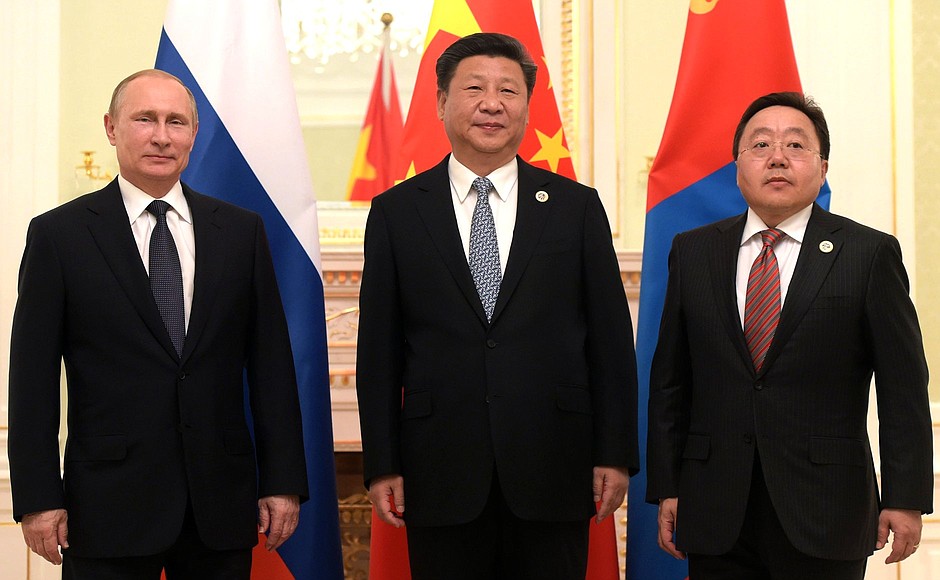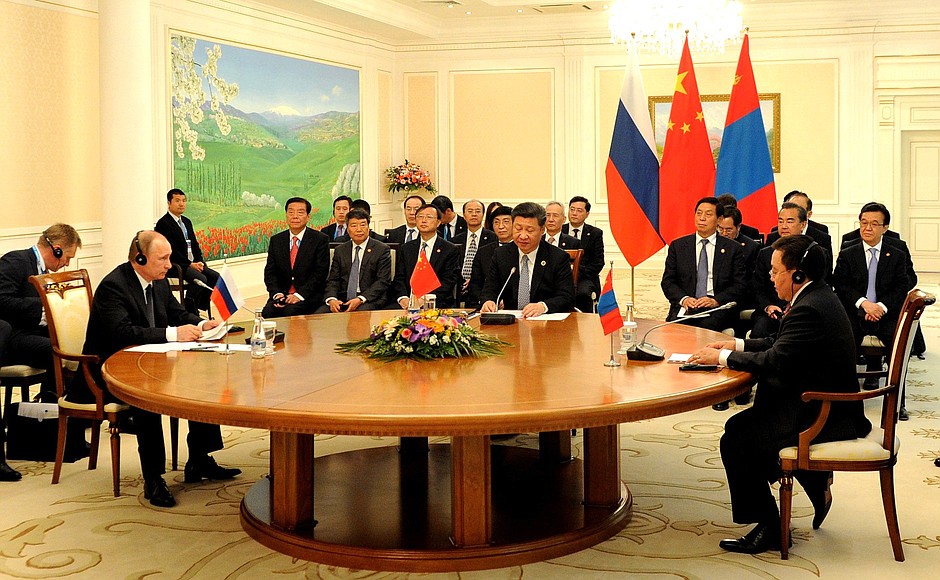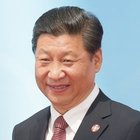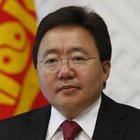Following the talks, the three presidents witnessed the signing of the Programme to Establish the China-Mongolia-Russia Economic Corridor and an agreement between Russia’s Federal Customs Service, China’s General Administration of Customs, and Mongolia’s General Tax and Customs Administration on mutual recognition of customs inspection results with regard to particular categories of goods.
* * *
President of China Xi Jinping (retranslated): President Putin, President Elbegdorj, it is a great pleasure to see you again.
Following our meeting in Ufa last July, we jointly approved the roadmap for developing our trilateral cooperation over the medium term. Our three countries’ ministries, local authorities and companies are working actively to implement this roadmap and organising intensive coordination of projects in trade, the economy, humanitarian ties, transit traffic, tourism and sport. The positive results are visible. Following our meeting today, we will witness the signing of an important cooperation agreement – the programme to establish an economic corridor.
This all shows that we are capable of knitting close cooperation ties as neighbours. I am happy with the way our trilateral ties are developing. We are ready to listen to your remarks and proposals on the next steps to take.
I give the floor to President Putin.
President of Russia Vladimir Putin: Friends, President Xi Jinping, President Elbegdorj, I am also very pleased to see you again.
Russia has traditionally friendly ties with China and Mongolia. We are building our trilateral partnership on the principles of good-neighbourliness, equality, and mutual respect.
Yes, a year ago in Ufa, we agreed to step up our cooperation in a broad range of areas. It is important that we have started implementing the roadmap to develop our trilateral contacts in politics, the economy, international affairs, and the cultural and humanitarian sector. We have launched a mechanism for political consultations now and this is a good opportunity for coordinating our positions on current regional issues.
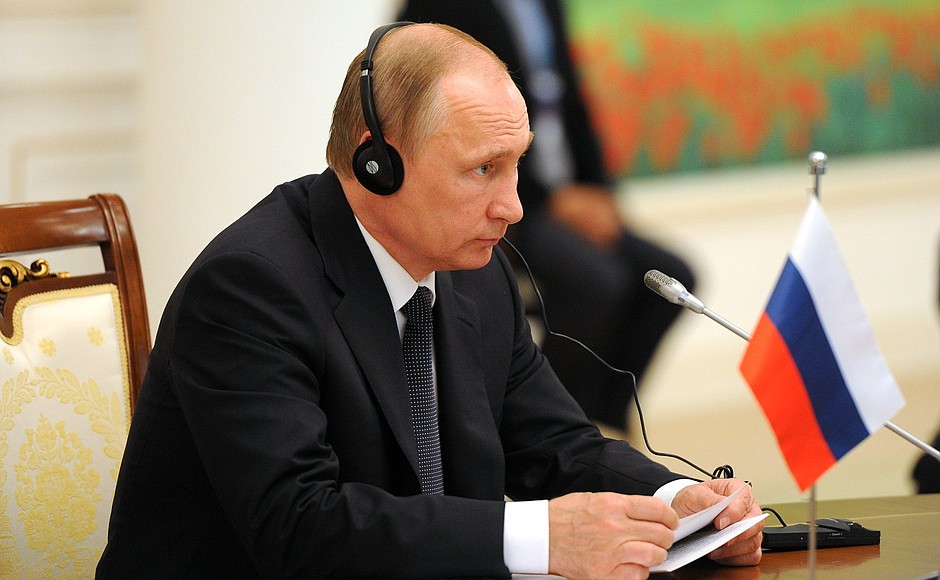
Building on the Ufa agreements, we have drafted a programme for establishing an economic corridor linking Russia, China and Mongolia. This programme seeks to substantially intensify cross-border ties by launching more than 30 trilateral investment projects.
Regarding the programme’s practical implementation, we think Mongolia’s idea of establishing a joint investment planning centre is a promising idea. Its main task would be to develop new cooperation proposals in transport, construction of communication and electricity transmission lines, and energy transport routes.
We also think it important to give priority attention to infrastructure initiatives. In particular, Russian business is ready to take part in modernising the Ulan Bator railway. I have discussed this on past occasions with the President of Mongolia. We will increase the railway’s throughput capacity to 100 million tonnes of freight a year. We will also develop road freight transport. This will help us to make better use of our countries’ transit potential.
We are sure that implementing these projects will help to develop regional integration projects too, especially the project to develop a Eurasian trade and economic partnership between the Eurasian Economic Union and the People’s Republic of China.
Further simplification of customs formalities will help to expand the trade ties between our countries, including ties between the border regions. The agreement on mutual recognition of customs inspections results that will be signed today will facilitate this.
We should most certainly continue working to strengthen contacts between our three countries’ business communities. In June last year, our countries’ chambers of commerce and industry held a successful forum in China. The next forum, which will take in Chita, in Russia, on August 5–6, has Russia’s active support.
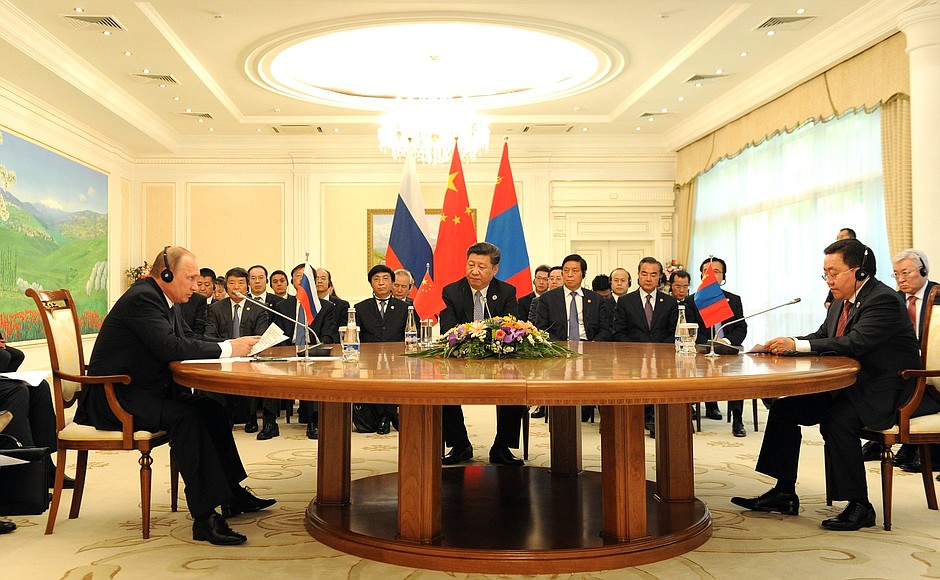
I want to say that we are seeing positive changes taking place before our very eyes in environmental cooperation throughout the entire region. I know that Mongolia plans to build hydroelectricity facilities in the Selenga River basin. We would like to study these plans very carefully with our friends in Mongolia and China.
Russia and international environmental protection organisations have made their position on these plans known: this project could create some risks for water supply to Russia’s Irkutsk Region and affect the unique ecology of Lake Baikal, as Selenga is the main river flowing into Lake Baikal.
We realise that Mongolia’s energy shortage is a serious issue. Clearly, this is something we must reflect on and we need to resolve this issue. But there are different ways to resolve this problem, above all by developing the entire region’s energy sector. For example, Russian power stations could increase electricity supplies to Mongolia’s northern regions.
We think it important to encourage cooperation not only in this sector but in others too, in tourism, for example. The Federal Tourism Agency is drafting a number of proposals. One of them is to organise an international tourism route – the Great Tea Route – that could link 20 Russian regions with China and Mongolia. We could launch a special excursion train on this route.
We will continue to do all we can to expand scientific exchanges. The establishment of an association of research centres in Russia, China and Mongolia will play a big part in this.
Let me say again that I think our trilateral partnership has great potential in many areas and we should put this to more active use for the good of our peoples.
Thank you for your attention.
President of Mongolia Tsakhiagiin Elbegdorj (retranslated): President of China Xi Jinping, President of Russia Vladimir Putin,
It is a great pleasure to greet you at this third summit of the leaders of Mongolia, Russia and China here in the capital of Uzbekistan.
Today, we will sign trilateral cooperation agreements such as the programme on establishing an economic corridor between Mongolia, Russia and China and the agreement between our three countries’ customs services on mutual recognition of customs inspection results with regard to particular categories of goods. The aim of establishing the economic corridor is to put in place conditions for expanding trilateral cooperation through increasing trade between our three countries.
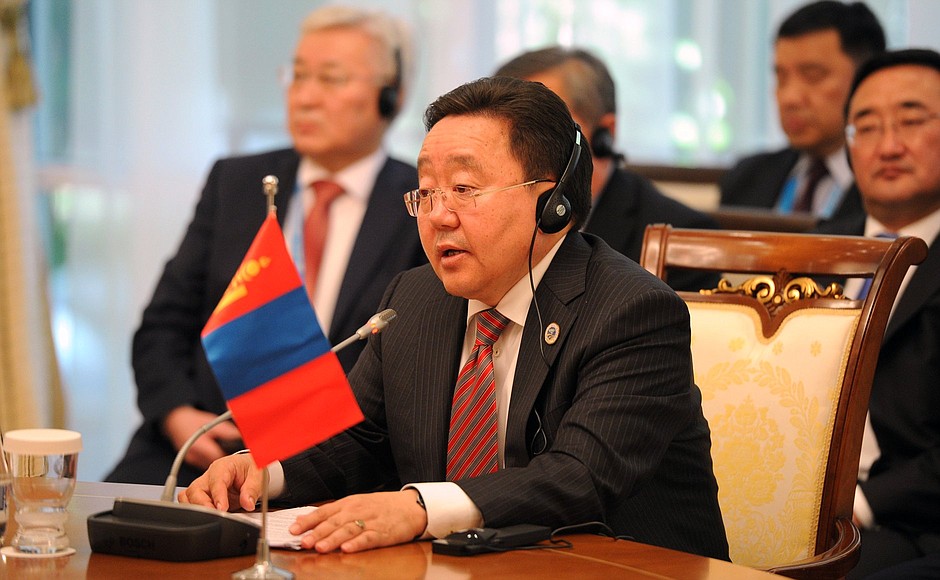
I would like to exchange views and settle the following matters during this meeting.
First of all, this involves the implementation of a programme to create an economic corridor. I suggest we select those projects, out of the 32 from the programme, which can be implemented now, and find sources to finance them. Given the fact that the parties agreed to establish an investment centre to determine funding and do a feasibility study of projects, I propose such a centre be created in 2016.
Then, as part of improving cooperation on roads and transport, we propose holding regular consultations with transport agencies of the third parties, which are a real mechanism to promote railway projects. The second meeting on current issues is expected to be held in August-September in Ulan Bator.
Third, determining promising avenues of trilateral cooperation. Our cooperation should not be limited to economic corridors or transport and customs issues. One of the directions is regional cooperation; we support in principle China’s initiative to develop cooperation between the eastern regions of Mongolia, Russia and China. Mongolia is ready to develop an appropriate plan of cooperation.
I also believe it possible to develop trilateral cooperation in agriculture and emergency prevention, response and relief based on the experience of bilateral cooperation.
I would like to end my speech with a suggestion to hold a trilateral meeting in Ulan Bator to step up our cooperation. I am confident that our mutually advantageous cooperation will make a significant contribution not only to the development of the three states but the region as a whole.
Thank you for your attention.
Xi Jinping: Thank you, President Elbegdorj.
President Putin and President Elbegdorj presented good proposals. I suggest the relevant agencies of the three countries carefully study and implement them.
And now I would like to share my opinion. We should comprehensively promote trilateral cooperation by linking the Chinese Silk Road Economic Belt and Russian strategies, in particular, the construction of a trans-Eurasian corridor, and the Mongolian Steppe Route.
The first task is to work responsibly on implementing the programme to create an economic corridor linking China, Mongolia and Russia. This programme is a practical step towards linking together our three countries’ development strategies and outlines priorities for our business cooperation. It is important that we pursue cooperation in areas such as transport infrastructure, building border crossing points and production facilities, developing investment, trade and the economy, humanitarian ties and environmental cooperation. We must work together to carry out priority projects so as to speed up achievement of stage-by-stage results in establishing the China-Russia-Mongolia economic corridor.
Second, we must step up our cross-border cooperation. Our three countries’ border regions have advantages in terms of their geographical location, comprehensive interlinking and cooperation mechanisms, and they share a common great desire to develop trilateral cooperation, have solid foundations for doing this, and could become priority regions for our work together. China supports our Mongolian partners’ initiative on cross-border economic cooperation.
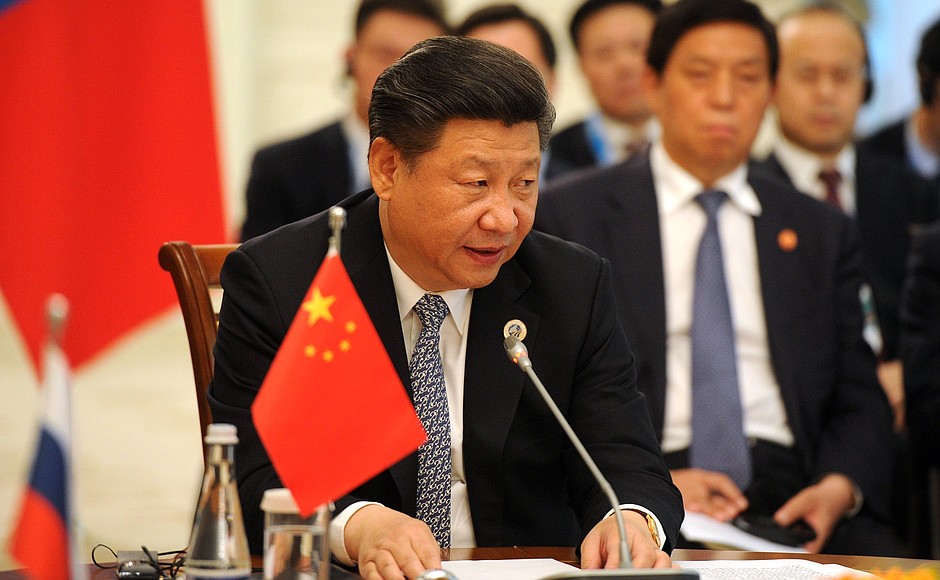
We propose taking the existing bilateral economic cooperation zone as a base we can build on to develop a trilateral zone with an emphasis on infrastructure construction, comprehensive interlinking, cross-border trade, industrialisation, tourism, and humanitarian ties. We should strengthen our links in industry and promote sub-regional cooperation in the interests of developing our countries’ border regions.
Third, we need to expand our cooperation within the SCO. The SCO has gained steadily in international influence over its 15 years of existence. More and more countries have shown their approval of the ‘Shanghai spirit’ and wish to develop cooperation with the organisation in order to work together on preventing threats and making use of development opportunities.
The accession process for new members we launched at the Ufa summit last year has progressed smoothly. The number of observers and dialogue partners is growing. This creates new development opportunities.
The SCO is a useful platform for our trilateral cooperation. Mongolia is the first observer country in the SCO. China is ready to work with Russia and other SCO member countries to strengthen our cooperation with our Mongolian partners, in particular, we are ready to work together on implementing the openness and partnership policy as part of the SCO’s development strategy through to 2025. We are ready to develop our work together with Mongolia in transit traffic, food safety, emergency situations, energy and other sectors.
This is my view. Overall, we have had a practical and useful discussion today.
Our Mongolian partners will chair the fourth summit next year. China is ready to provide all-round support in this.
Thank you.
